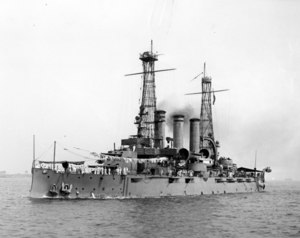USS Nebraska (BB-14)

Nebraska off of New York City in July 1910
|
|
| History | |
|---|---|
|
|
|
| Name: | Nebraska |
| Namesake: | State of Nebraska |
| Builder: | Moran Brothers Shipbuilding |
| Laid down: | 4 July 1902 |
| Launched: | 7 October 1904 |
| Commissioned: | 1 July 1907 |
| Decommissioned: | 2 July 1920 |
| Struck: | 12 July 1922 |
| Fate: | Sold for scrap |
| General characteristics | |
| Class and type: | Virginia-class battleship |
| Displacement: |
|
| Length: | 441 ft 3 in (134 m) |
| Beam: | 76 ft 3 in (23 m) |
| Draft: | 23 ft 9 in (7 m) |
| Installed power: | 19,000 ihp (14,000 kW) |
| Propulsion: | |
| Speed: | 19 kn (35 km/h; 22 mph) |
| Complement: | 812 |
| Armament: |
|
| Armor: |
|
USS Nebraska (BB-14) was a Virginia-class pre-dreadnought battleship of the United States Navy, the second of five members of the class, and the first ship to carry her name. She was built by the Moran Brothers shipyard in Seattle, Washington, with her keel laying in July 1902 and her launching in October 1904. Slipping into the water eleven minutes ahead of schedule, her quick thinking sponsor, Mary Nain Mickey, the daughter of Nebraska state governor John H. Mickey, still managed to christen her before she slipped out of reach. The completed ship was commissioned into the US Navy in July 1907. The ship was armed with an offensive battery of four 12-inch (305 mm) guns and eight 8-inch (203 mm) guns, and she was capable of a top speed of 19 knots (35 km/h; 22 mph).
Nebraska joined the Great White Fleet after it reached the west coast of the United States in 1908 and continued with it during its circumnavigation of the globe. From 1909 to 1914, the ship conducted normal training and ceremonial duties with the Atlantic Fleet. She was deployed twice to Mexico during the Mexican Revolution, in mid-1914 and mid-1916, before being decommissioned briefly in 1916. She was reactivated shortly before the United States entered World War I in April 1917, and was thereafter used as a training ship and later as a convoy escort. After the war, she transported American soldiers back from France, and in 1919 she was transferred to the Pacific Fleet, though she remained in service for less than a year, being decommissioned in July 1920. The 1922 Washington Naval Treaty mandated her disposal, which was effected in November 1923, when she was broken up for scrap.
...
Wikipedia
